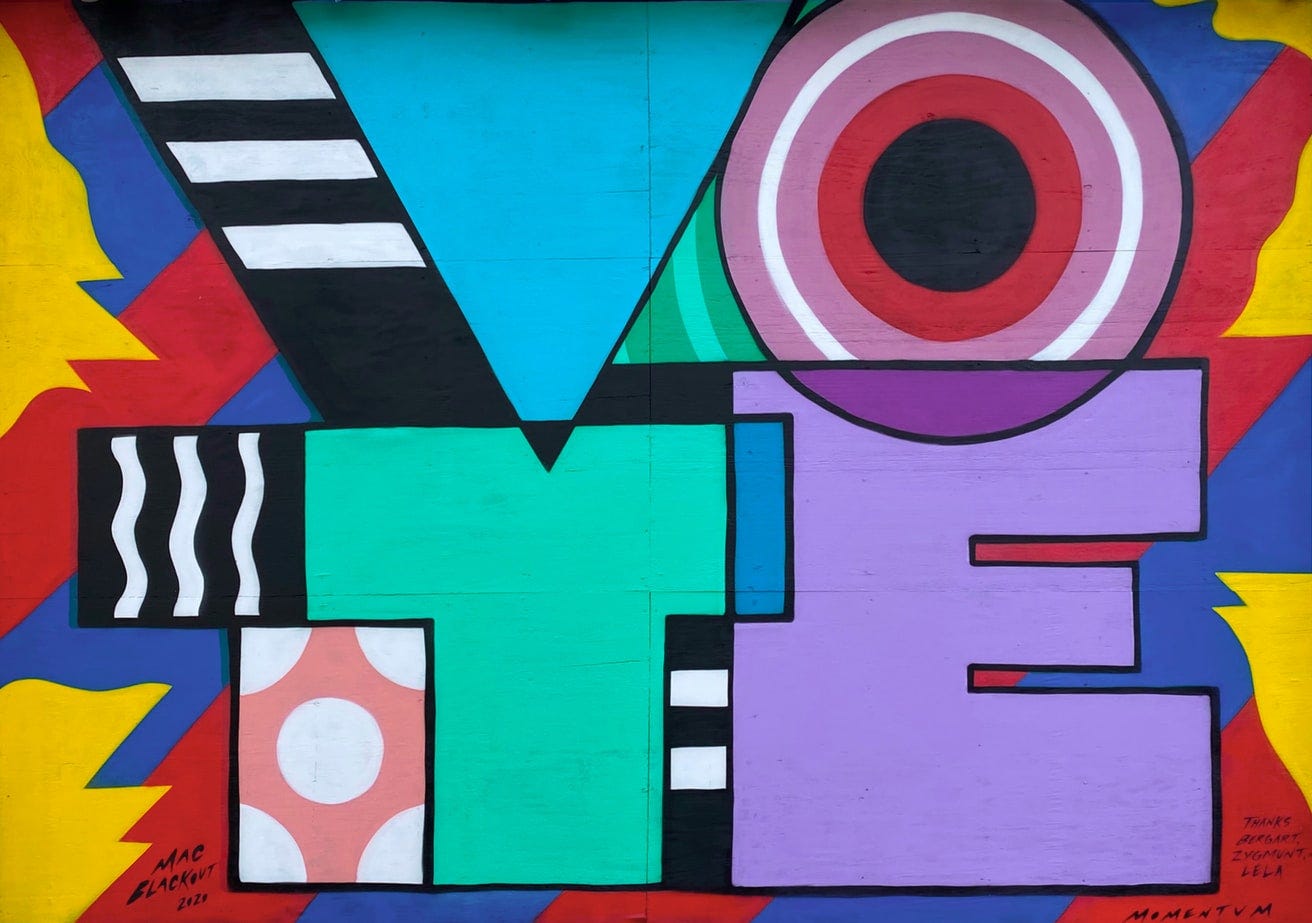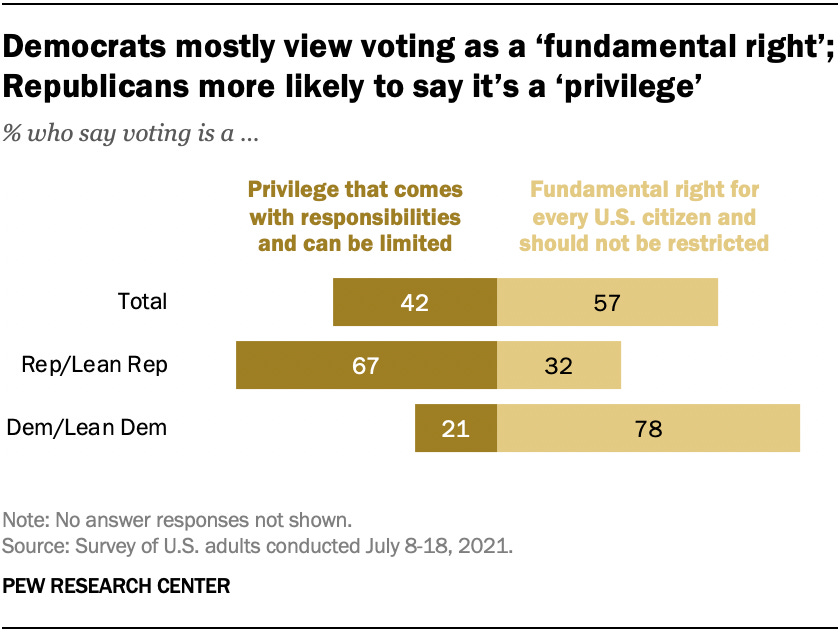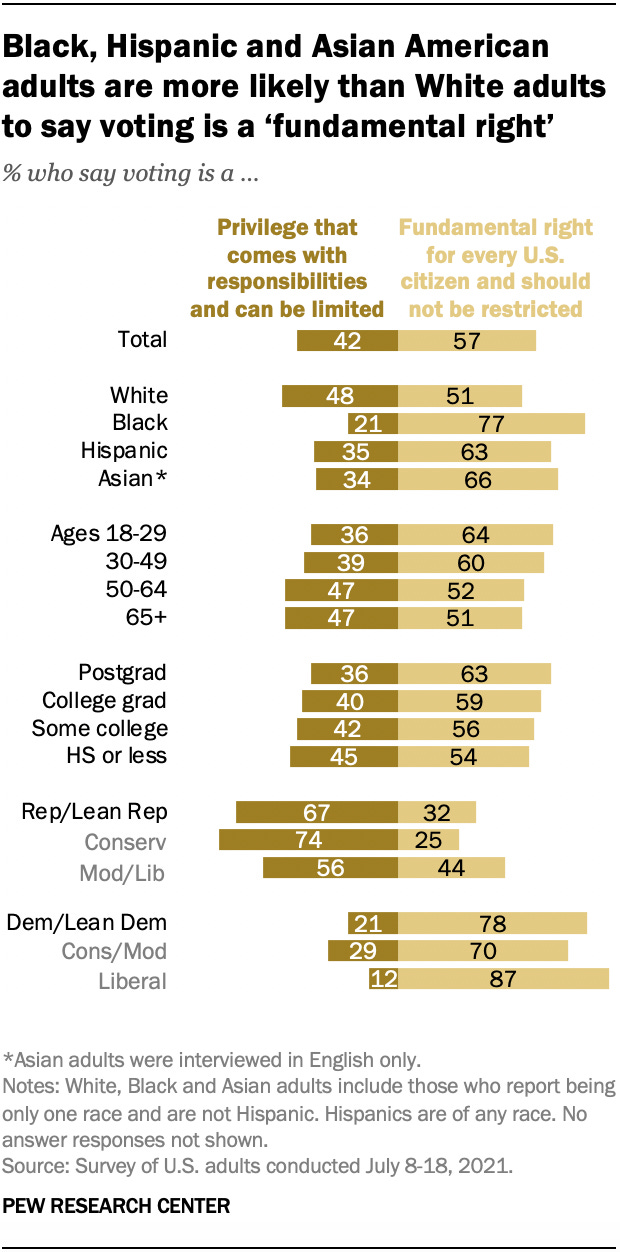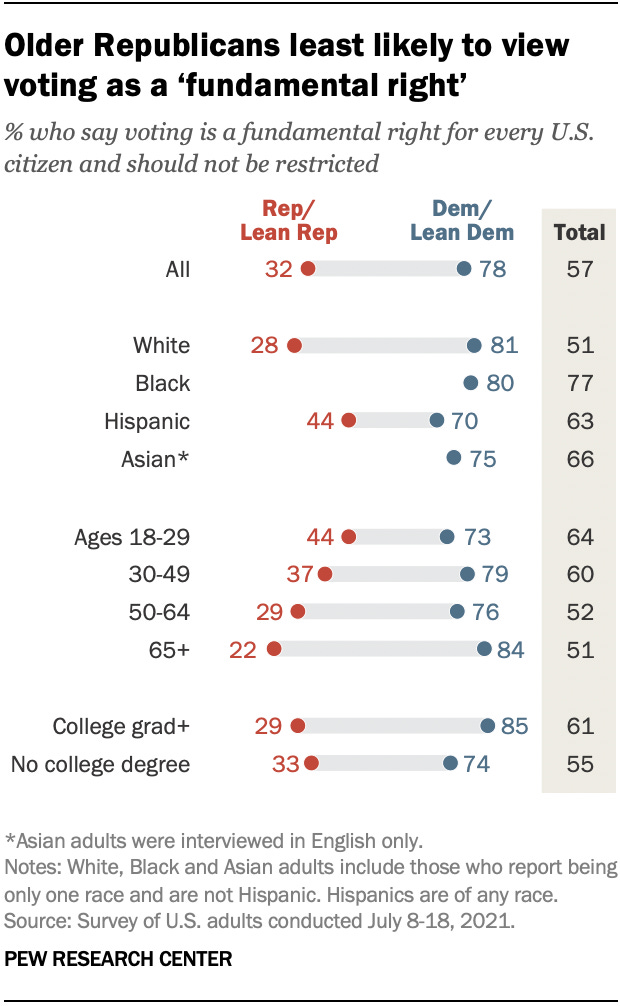Even self-government is now a partisan issue 📊 July 23, 2021
New polling shows Republicans prefer to think of voting as a privilege, while Democrats call it a fundamental right
This is my weekly data-driven newsletter on politics, polling, and democracy — and whatever else I’m thinking about. If you want more frequent posts on these subjects please sign up for a paid subscription. I send out subscribers-only posts twice each week.

A new poll on voting from the Pew Research Center is my pick for the poll of the week. Their politics team has asked Americans whether they think voting is a “fundamental right for every US citizen and should not be restricted” or a “privilege that comes with responsibilities and can be limited”. The poll reveals a wide partisan divide in support for mass democracy for qualified citizens: while 78% of Democrats say voting should be a fundamental right, under a third (32%) of Republicans say the same. Instead, 67% of GOPers think the franchise should be limited if people don’t meet their responsibilities. (The primary legal responsibility for voting, mind you, is citizenship.)
The reason I think this poll is so important is that it serves as a necessary barometer of public support for fundamental rights after over six months of violence, protest, and politicization of free and fair elections in the country. Through legislation, for example, have known for months that Republican elected officials do not see suppression of legal votes as a harmful consequence of their new laws that are designed in most cases to make voting a little harder and decrease opportunities for (effectively non-existent) fraud, and, in some, to simply make it harder in cities (where their political opponents are concentrated.) We have also observed that many elites support this sentiment, with some even calling for restrictions laws that produce a smaller, more “qualified” pool of voters to steer the ship of state.
But so far, we haven’t really seen a lot of polling on the question that naturally arises from all this: has support for voting — democracy itself — been polarized as a result? The Pew poll indicates it has.
Though some of this polarization undoubtedly existed before the partisan backlash to voting access and the 2020 election, I think political science research gives us cause to think much of the difference is due to polarized messages from elites — including elected officials, media columnists, and on cable news.
It is worth briefly speculating about the underlying voter psychology here.
One study that comes to mind is a 2018 paper from sociologists Rachel Wetts and Robb Willer that found white people become less supportive of social services when they are primed with the statement that the white majority is declining in numbers due to the growing size of racial and ethnic minorities. Their experiment was run after finding a simultaneous increase in racial resentment and decrease in support for welfare after Barack Obama’s election in 2008. As racial conservatism and psychological “closed-ness” rose in the subsequent decade and then became concentrated in the Republican party, we might expect the same underlying tendency to support things only for the racially homogenous in-group would bleed into their belief that voting should be restricted for people who fulfil the right requirements.
You might posit that this just means Republicans only want smart, educated people to vote. But not all Republicans have degrees — in fact, education is correlated with supporting Democrats. Plus, voters with a high school diploma or less were the most likely in Pew’s poll to land on the “privilege” side of the question. The biggest predictor of what someone believed was simply whether they were a Republican or a Democrat:
Yet there were other important demographic dimensions to the poll. White and older Republicans were the least likely to view voting as a “fundamental right”. This should sound familiar! Those voters also rank highest on scales of ethnic antagonism — and are, generally, the base audience for Fox News. Given the programming coming from the channel, it’s not so surprising that many Republicans would stereotype the unqualified other as a non-white voter that doesn’t look, talk, or act like them.
Of course, we do not need new data to confirm that support for democracy is racialized. Nor is it surprising that the dominant group in society would be the most resistant to enfranchising its opponents. But it is also good to check in with political psychology and sociology from time to time to better understand the numbers.
. . .
Still, the biggest divide in Pew’s poll was by party affiliation. That is consistent with what we know about opinion leaders, and it indicates to me that elites have polarized voting rights and access — perhaps even intentionally for their own gain. We should dismay at that; we cannot have a competitive democratic republic if one party does not even believe in democracy. The political system has too many perverse incentives to be able to sustain that level of violation of our social contract. The other way of framing this is that, if most Republicans believe lots of people aren’t qualified to vote, then they also believe other people are better prepared to govern them then they are those elves — support for self-government itself has become a partisan issue.
But the optimist in me wants to think that if politics got us into this mess, it can get us out. If Republican elected officials’ anti-voting stances are so unpopular that they are held electorally accountable for them, there may be a narrow window for them to change course. The Pew poll is useful in contextualizing the intra-party dynamics of that opposition to voting rights; if the party change its mind, it is probably not going to be persuaded from within or from the ground-up.
Posts for subscribers
July 21: The "worst polls in decades" call key assumptions of surveying, and forecasting, into question. The politicization of public opinion surveys has hurt their ability to reach a representative portrait of Americans. But surveys are still useful, despite critics' claims.
July 24: A subscribers-only thread on Republicans’ surprisingly high support for some climate policies
Links to what I’m reading and writing
Here’s a piece from me on Americans’ increasing prioritization of climate change.
I have a lot in the works but nothing else to share yet. Here’s a fun conversation on aliens that I enjoyed.
Thanks for subscribing
That’s it for this week. Thanks so much for reading. If you have any feedback, please send it to me at this address — or respond directly to this email. I love to talk with readers and am very responsive to your messages.
If you want more content, you can sign up for subscribers-only posts below. I’ll send you one or two extra articles each week, and you get access to a weekly gated thread for subscribers. As a reminder, I have cheaper subscriptions for students.
In the meantime, follow me on Twitter for related musings.






